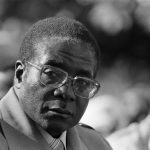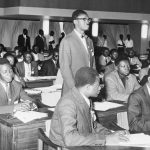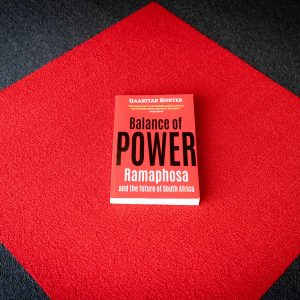How one 1990 political rally changed Zimbabwe
A child tries to make sense of a Zanu-PF rally in Kwekwe, a town on the eastern edges of one of the provinces affected by Gukurahundi, Robert Mugabe’s genocidal war against Ndebele-speaking people.…
Author:
25 March 2020

I stared at the gathering with the wide-eyed curiosity of a small child. As I witnessed the “banalities” just before an election in Zimbabwe, a violent pulse started up in my chest.
A horde regularly gathers a hundred metres or so from polling stations, clad in political party regalia. For a whole day, they drum, sing, dance and loudly swear, all in devotion to their political parties. If you live in suburban Harare, Zimbabwe’s capital, your only contact with this would be on newspaper pages – the raucous, faceless, dispensable people.
When I attended my first gathering, I was barely six – still reeking of my mother’s breast milk, as my people say of little children. I was too young to understand what I was seeing on that March morning in 1990, but I can vouch for the atmosphere of the events.
Political lingo
The words and names that flew around at the meeting that day weren’t familiar: Comrade Robert Mugabe, Comrade Emmerson Mnangagwa, Comrade Enos Nkala, Joshua Nkomo, Mr Patrick Kombayi, Mr Edgar Tekere, Zimbabwe Unity Movement, Zanu-PF, PF-Zapu, votes, patriotic, dissidents, youth brigade, fifth brigade, campaign, perm.
I associated this confusing cluster of words and names with the experiences of my family and friends arriving in Kwekwe from the rural areas. These people – internal refugees – crowded in our three-roomed township house for months on end. Later I learned that for many of them, life in the rural areas – the isiNdebele-speaking central-western parts of the Midlands and much of the Matabeleland provinces – had become unbearable: gunshots and wailing, a bayonet aimed at the torso and constant, terrible mourning. These experiences were common in the villages. So, too, were forced night vigils, sloganeering and singing in the language of gun-toting soldiers – chiShona – which many of the villagers spoke and understood with difficulty.
Related article:
Starting in 1983, the soldiers had been unleashed on the two provinces of Matabeleland and Midlands in the name of an army operation codenamed “Gukurahundi” (chiShona for “spring rains that washes away the chaff”). The government, ostensibly, wanted to rid the country of armed political dissidents in the regions, but “madness” took over as President Robert Mugabe said years later. So deranged were the soldiers that they couldn’t distinguish the dissidents from civilians, the culpable from the innocent. In any case, they may have thought, all the people in these regions made clicking sounds in the name of language, and all seemed to support the same opposition party – Joshua Nkomo’s PF-Zapu – so everyone had to bear the consequences. With glee, the soldiers hit the hare together with the shrub in which it hid.
The city to which the villagers ran for refuge was not untroubled either. There was what was called “perm” – named for the fashionable hairstyle in which hair was fried with chemicals – a subdued, Coca-Cola lite version of what was happening in the rural areas. Whereas the army menaced the rural landscape, the ruling party’s “youth brigades” roamed the townships’ streets. In rural areas, suspicion of political dissidence, or even a soldier’s whim, could mean death. In the townships, the youth brigades stopped after breaking limbs, setting fire to properties or forcing a suspected opposition supporter to renounce opposition politics and follow the true path, gwara remusangano. Death, of course, couldn’t always be ruled out, usually the result of an overzealous beating and police inaction or connivance.
No political talk
The interminable years of the Gukurahundi operation ended in 1987 after Joshua Nkomo’s PF-Zapu became one with the ruling Zanu-PF under the terms of a “unity accord” he signed with Mugabe. Our house slowly decongested as extended family and friends returned to the rural areas. Things took on a semblance of normalcy. My father sought to stabilise this by banning political talk in our house. But the quiet didn’t last long.
In 1990, the ruling party was knocking on people’s doors once again, mobilising against new political dissent. Edgar Tekere, a founding member of the ruling party, had resigned, bewailing rampant corruption in government. Tekere had formed his own party, the Zimbabwe Unity Movement (Zum), to contest in the 1990 general elections.
Related article:
My mother, like many of her peers working at the township’s market, helped organise the ruling party’s local cells, sometimes through contributing bowls of mealie meal, cups of cooking oil and bundles of vegetables, and sometimes doing the “collections” for the party, but usually by attending the campaign meetings. In this way, the mothers of the township presented themselves as the face of their families during party activities. My mother actively swatted away suspicion that our family was against the ruling party. She shielded my father, who was a combatant for PF-Zapu, from suggestions that he hadn’t learned his lesson from his seven-month detention in the early days of Gukurahundi. What he had learned could be summed up in his often-repeated remark: Zimbabwean politics was “poison”.
I accompanied my mother to the ruling party meeting at our township community hall, the old Alfred Beit Hall, which was also used as the main polling station on election day. It was her cell’s turn to organise the campaign day, which meant, among other duties, cooking for party members. We arrived late, towards midmorning. Young men and women were already rehearsing their singing and drumming, smoke was smouldering at cooking fires. “Patrick Kombayi is dead,” someone whispered among the mothers, hoarse from singing since dawn. “No, he is alive,” someone else corrected, “just injured.”
Based in Gweru, the provincial capital, Kombayi was one of the best-known businessmen in the Midlands. He was highly regarded for his role in bankrolling Zanu-PF during the 1970s war. For those of us gathered at the community hall that morning, he was – at least this is what was expressed openly – ungrateful, rejecting the party whose patronage, probably benefaction, had allowed him to own an imposing colonial-style hotel in the heart of Gweru, among a string of other businesses. Kombayi had done the unforgivable, it seemed, by casting his lot in with the “dissident” Tekere. He got his comeuppance by being shot by a government spy and some party youth. The bullets went into his groin. He survived, but he had a limp until his death in 2009, serving as a reminder to him and a warning to others. The parliamentary seat was later won, resoundingly, by the ruling party candidate Simon Muzenda, one of the country’s two vice presidents.
Related article:
Singing gradually soared at the meeting. Wet as eels, the youthful drummers’ brows were greased with perspiration as they bit into their lower lips with ecstatic agony, whacking the drums’ hides. The din rose into the air above the drooping sheoak tree, under which we gathered.
“Vhotera paJongwe, bereka mwana tiende chauya chauya! [Put your vote where [Zanu-PF’s symbol] the cockerel is, carry the baby and let’s go, don’t worry about what comes after.]”
The mood of the crowd pulled at once towards violence and the carnivalesque. The lead chanter of the most melodious songs, the performer of the most graceful dances, also wielded the skull-splitting knobkerrie. He seemed ready to use it – and it gave voters a clue as to where they should make their mark.
Playing to the gallery
Towards midday, the local municipal councillor arrived and climbed onto a rock podium. He was a well-upholstered man, with a sumo-wrestler face and the common feature of the new African politico: a well-fed stomach that filled up his safari suit. “Phambili ngomanyano! Srrrluuu-srrrluuu Pamberi nekubatana! Srrrluuu-srrrluuu! [Good afternoon mothers and fathers, boys and girls. Srrrluuu!],” he slurped after every sentence.
He relayed a message of appreciation for “the boys” who had rid the country of its enemies, by which he meant, of course, the supporters of politicians such as Tekere. He wanted them to know that even the country’s president was conscience-stricken not to have delivered the message himself, but for an urgent matter of national good, he sent the councillor, via the ruling party’s district chairperson, via the sitting member of Parliament, via the provincial governor, via the minister of home affairs, via the president’s private secretary. He told the crowd to keep shutting out the enemies of the nation and – generous as he was – he left it to the boys’ inventiveness as to how they would keep achieving their excellent work. “Viva!” the boys howled, lifting their muscled arms.
Related article:
The councillor had brought with him boxes of bread and a huge packet of shag tobacco from his shop, a drum of masese or sorghum beer from his bar, extra packets of meat – beef trotters and innards – from his butchery. The applause was scattered as the crowd was now preoccupied with their bellies. Quarrels on the allocation of beer ensued before the councillor finished his speech. An even bigger and now motley crowd – old men and women, drunks and novice drinkers – shouted and beer splattered all over as the councillor watched in horror. On the margins, some boys pulled on the packet of tobacco like a pair of honey badgers at mealtime. Not far from the podium, women stood among and monitored drums filled with sadza or pap, which now and again swelled and popped like lava. The women used the hems on their aprons and skirts to wipe their smoke-smarting eyes and to blow their noses. “Kuyabongeka lokho! Tinotenda! li-li-li-li-li-li-li-li!,” they ululated in gratitude, giving thanks to the councillor. He smiled smugly.
It takes long to soften beef trotters and tripe – even longer if the fire is not hot enough. So, time was not to be wasted by men milling around the cooking mothers. It breeds trouble, the councillor reasoned. All the boys, by which he meant fit young people, were to leave the “base” and do one more round of canvassing, just in case a few oppositional minds still lurked in the township.
Raise those legs
But before they dispersed, a huge banner was unveiled. It depicted the president’s face with exaggerated features – his enormous 1970s glasses, a narrow moustache in the middle of a deep and elongated cleft on his upper lip. The paint was still fresh and dripping, giving the impression of sweat on the president’s forehead. It was a last-minute project at the councillor’s request, his way of empowering youth in the community.
We, the little ones, trusted for our nimble and fast feet, were sent off to collect more supplies, more cabbages, more tomatoes, more cooking oil, more firewood, from the market stalls where most of our mothers worked. Those a little older were sent for additional drums from a nearby school and more pews from the community hall. As all this was going on, the scent of food wafted far beyond the gathering, inviting more cadres. “Simudza mukumbo, hauzi wako, ndewemusangano, kana wadambuka, tokupa rimwe. [Raise those legs [in a jog], they aren’t yours, they belong to the party, if you lose them, we will replace them.]”
The youth hopped away as they headed for the township. I had memorised the new songs and dance moves, which soon began. Mothers clapped and joined in. It was a mix of the brutal and the brilliant, a momentary diversion from what could become rage running out of control. Every war is accompanied by song: think of the hymns and chants, the Zulu amahubos and iziqubulo, the British bugles, the neighing of horses, blasts of muskets and clanks of assegais that soaked the morning air at the foothills of Isandlwana in 1879.
The boys returned after an hour or so, earlier than expected, chanting with increased ardour and triumphant as they jogged around the steaming drums of food. “Toenda kwaMutare netsoka, tichanoshayinira Tekere, tora sub, takunoshainira Tekere. [We are going to Mutare on foot, we will spite Tekere, bring my sub [machine gun]].”
Related article:
Dusk arrived. The youth were full of food. The music continued, now mingled with drunken zeal. As the mothers, fathers and little ones prepared to leave, a fight broke out between a young man and woman. They were bashing each other senseless. The woman was a handsome giant with what looked like a scorpion tattoo on her shoulder. She was broad and chiselled, straining inside her party T-shirt. The story involved something about sex the night before inside the community hall where the youth retreated to sleep during the peak days of the campaign. We left them to solve the problem among themselves.
On our way home, an unsteady old man walked in front of us. He quaffed the masese dregs he had salvaged from the beer scramble and sang, “Nyama yembongolo keth’omthandayo! Nyama yembongolo keth’omthandayo. [Donkey meat, choose the one you love.]”
We arrived home in time for the 8pm news, which, as a rule, was a time of quiet. My father needed only to gesture and the room descended into silence. We helped by kicking the dogs outside. He pushed his chair close to the set. In those days, it was usually a white anchor, hair gelled and side-parted, and his black colleague whose English accent was a discernible put-on.
My father rarely looked at the pictures, preferring to direct one ear towards the television while nodding at every sentence. The president, a day ago, had finished his campaign trail, the anchors reported. He was confident of a reverberating victory. “Politics is poison,” my father murmured. In the distance, we heard the drums going late into the night.
Tomorrow was election day.





